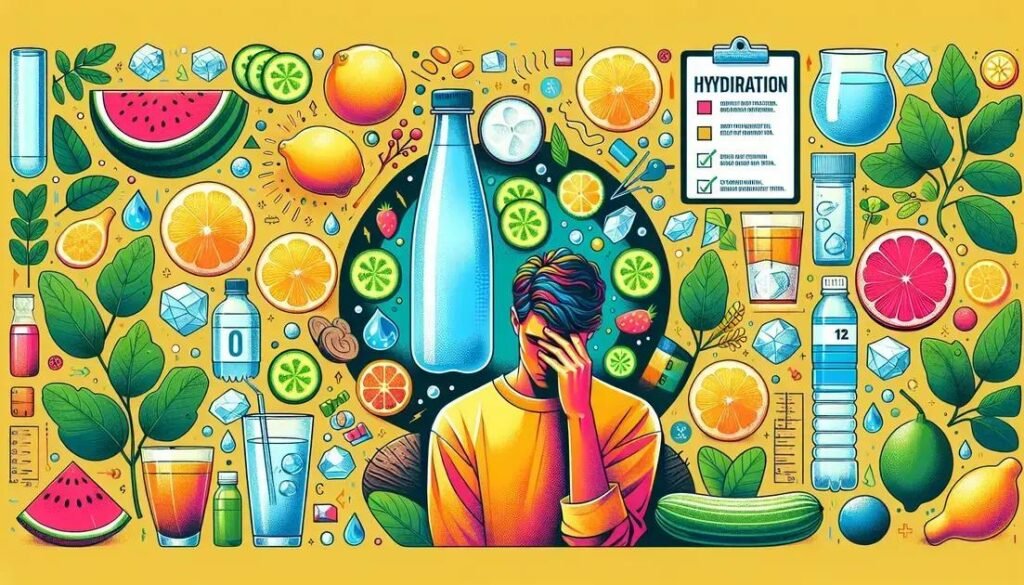Staying hydrated is crucial for our overall health and well-being, but many of us struggle to drink enough water throughout the day.
According to studies, even mild dehydration can cause fatigue, headaches, and difficulty concentrating.
In this article, we’ll explore the importance of hydration, common mistakes to avoid, and provide expert tips to help you stay refreshed and focused all day long.
Table of Contents
Understanding the Importance of Hydration
Hydration is a critical aspect of our overall health, and its importance cannot be overstated. Water makes up approximately 60% of our body weight and plays a crucial role in regulating body temperature, transporting nutrients, and removing waste products.
Even mild dehydration can cause fatigue, headaches, and difficulty concentrating, which can significantly impair our daily activities. Furthermore, chronic dehydration has been linked to a range of serious health problems, including kidney stones, urinary tract infections, and even kidney damage.
In this context, it is essential to prioritize hydration and make it a habit to drink enough water throughout the day.
Common Mistakes to Avoid
One common mistake to avoid when it comes to hydration is ignoring your body’s signs of thirst. Many of us are guilty of waiting until we’re already feeling parched before reaching for a drink. However, this can lead to dehydration and even more serious health problems.
Additionally, consuming sugary drinks and caffeine can further exacerbate dehydration, making it even more important to prioritize water intake.
Furthermore, neglecting to drink water during exercise or in hot weather can lead to severe dehydration. It’s essential to stay hydrated by drinking water regularly, especially in situations where dehydration is more likely to occur.
The Best Hydration Sources
When it comes to staying hydrated, it’s essential to know where to find the best hydration sources. Water is the most obvious choice, and it’s recommended to drink at least eight cups (64 ounces) per day. However, not all water is created equal. Look for sources that are free of contaminants and additives, such as filtered water or spring water.
Additionally, consider incorporating electrolyte-rich drinks like coconut water or sports drinks into your hydration routine, especially during or after intense physical activity. Other options include herbal teas, low-sugar juices, and even milk and other dairy products.
It’s also important to choose beverages that are low in sugar and calories to avoid undoing the benefits of proper hydration.
Signs of Dehydration
Dehydration can manifest in various ways, and it’s essential to recognize the signs to take preventive measures.
One of the most common signs of dehydration is fatigue or feeling tired and sluggish. Other symptoms may include headaches, dry mouth, dark urine, and dizziness.
In severe cases, dehydration can lead to more serious health issues, such as kidney damage, seizures, and even death.
Additionally, dehydration can also cause digestive problems, including constipation and nausea.
If you’re experiencing any of these symptoms, it’s crucial to drink plenty of water and seek medical attention if the condition persists or worsens.
Prevention and Treatment
Preventing dehydration is crucial, and there are several steps you can take to reduce your risk. First, make sure to drink plenty of water throughout the day, especially during exercise or in hot weather.
You can also consume electrolyte-rich drinks like coconut water or sports drinks to help replenish lost salts. Additionally, try to avoid sugary drinks and caffeine, which can further dehydrate the body.
Another important step is to monitor your body’s signs of dehydration, such as dark urine or dry mouth, and take action to correct it before it becomes severe.
Finally, consider consulting with a healthcare professional if you have a history of dehydration or if you experience frequent episodes of dehydration.
Conclusion
In conclusion, hydration is a crucial aspect of our overall health and well-being. By understanding the importance of hydration, avoiding common mistakes, and incorporating the best hydration sources into our daily routine, we can significantly reduce our risk of dehydration.
Recognizing the signs of dehydration and taking preventive measures can help us stay healthy and avoid serious health complications. By following the tips and guidelines outlined in this article, you can ensure that you are properly hydrated and ready to take on the day.
Remember to prioritize your health and well-being by staying hydrated and taking care of your body.
FAQ – Frequently Asked Questions About Hydration
What are the signs of dehydration?
The signs of dehydration can include fatigue, headaches, dry mouth, dark urine, and dizziness. In severe cases, dehydration can lead to more serious health issues, such as kidney damage, seizures, and even death.
How can I prevent dehydration?
To prevent dehydration, make sure to drink plenty of water throughout the day, especially during exercise or in hot weather. You can also consume electrolyte-rich drinks like coconut water or sports drinks to help replenish lost salts.
What are the best hydration sources?
The best hydration sources include water, coconut water, sports drinks, and herbal teas. Avoid sugary drinks and caffeine, which can further dehydrate the body.
What are the common mistakes to avoid when it comes to hydration?
Common mistakes to avoid include ignoring your body’s signs of thirst, consuming sugary drinks and caffeine, and not drinking enough water throughout the day.
Can dehydration be treated?
Yes, dehydration can be treated by drinking plenty of water and electrolyte-rich drinks. In severe cases, medical attention may be necessary.
Why is hydration important?
Hydration is important because it helps to regulate body temperature, transport nutrients, and remove waste products. Even mild dehydration can cause fatigue, headaches, and difficulty concentrating.



